HIPAA Compliant Workspace
Introduction
This document is intended for developers who are integrating 100ms inside their telehealth apps, are subject to HIPAA compliance and intend to enter into a Business Associate Agreement (BAA) with 100ms. There are aspects of HIPAA controls that 100ms has put in place for all of our customers. Additionally, it also outlines the customer’s responsibility to ensure that their applications built on 100ms refer to these requirements to architect a solution that supports HIPAA compliance. This guide is assuming that the user already has an account on 100ms.
Get a primer on HIPAA compliance in this blog.
Basics
This section outlines 100ms' security framework and technical implementation, covering:
- Implementation details consistent across all product features.
- A uniform security experience for all users, unless noted otherwise.
Video calling and media security
- 100ms does not store your video, audio or screensharing data.
- All of 100ms’ video and audio calls are encrypted to and from 100ms’ SFU servers. Encrypted media in transit is decrypted only in the server memory, ensuring that the exposure of the decrypted stream is as minimal as possible. At the application layer, we never have access to unencrypted media.
- All audio, video, and screen sharing media are transmitted and encrypted using the Secure Real-time Transport Protocol (SRTP) which is encrypted over Datagram Transport Layer Security (DTLS) with AES 256-bit encryption.
- TURN servers are media relay servers only so there is no processing or storage of media. TURN servers do not and cannot decrypt the media that they relay.
- Disk encryption is enabled on the servers.
Recordings
- Recordings in 100ms are strictly opt-in, and it can be specified by customers when to start or stop their recordings.
- Recordings, when stored with 100ms, are stored on encrypted disk servers and deleted after 15 days.
- Only for HIPAA Workspaces - Recording with the customer’s cloud storage bucket configured on 100ms is the only method allowed by 100ms. As soon as the recording for a particular session is complete, it is uploaded to the customers’ storage and immediately deleted from ours.
- Only for HIPAA Workspaces - Access to customers’ buckets cannot be obtained by 100ms because write-only access is enforced when configuring the customer’s storage bucket.
- In case of a failure of processing or upload of recordings, the failed recordings are stored with 100ms' secure file storage for up to 7 days and reupload is attempted during this period. After 7 days, these files are automatically deleted.
Post call transcription
- Post call transcription is an opt-in feature, which requires call recording to be enabled by the customer.
- A speaker-labeled transcript is generated upon completion of the call recording.
- Transcripts are generated and processed on 100ms’ servers. No data from the transcription process is used for training any AI models.
- Transcripts are not stored by 100ms once generated.
- The audio file of the recording is securely stored within 100ms’ temporary file storage for up to 14 days in the same region as the customer’s workspace if post call transcription is enabled. This is to ensure that in case of a failure of processing or upload of the recording, transcript or summary, the data is not lost for the customer. After 14 days, the files are automatically deleted.
- The transcript itself is not stored by 100ms. In case of a failure of processing or upload, the transcript is regenerated, and a reupload is attempted. If the reupload is successful, all stored files are promptly deleted.
AI-generated summary
- AI-generated summary is an opt-in feature, which requires call recording as well as post call transcription to be enabled.
- 100ms uses an external service for generating summaries. A HIPAA Business Associate Agreement (BAA) has been signed between 100ms and the service provider.
- No data is stored by 100ms or the sub-processor providing the service.
- The data is not used for training any AI models.
- Summaries are not stored by 100ms once generated.
- The audio file of the recording is securely stored within 100ms’ temporary file storage for up to 14 days in the same region as the customer’s workspace if post call transcription is enabled. This is to ensure that in case of a failure of processing or upload of the recording, transcript or summary, the data is not lost for the customer. After 14 days, the files are automatically deleted.
- The summary itself is not stored by 100ms. In case of a failure, the transcript and the summary are regenerated, and a reupload is attempted. If the reupload is successful, all stored files are promptly deleted.
Closed captions
- 100ms uses an external service for speaker-labeled closed captions.
- A HIPAA Business Associate Agreement (BAA) has been signed between 100ms and the service provider.
- No data is stored by 100ms or the sub-processor providing the service.
- The data is not used for training any AI models.
Session Initiation Protocol (SIP) - Audio and Video
- Media encryption is performed using the AES_CM_128_HMAC_SHA1_80 cryptographic suite.
- Media is not stored at any point; all transmissions are transient.
- Phone numbers, when used, are masked and securely stored in call logs only.
Secure webhooks
Customers building HIPAA compliant workflows on 100ms webhook events are required to ensure that requests coming to your application are indeed coming from 100ms. To achieve this, we have put in four safeguards:
-
Customers can use configure secret headers on the 100ms dashboard and verify the webhook once it is delivered to them using the same.
-
Customers can whitelist 100ms IP addresses that are used to send webhooks.
-
Only for HIPAA Workspaces - 100ms mandatorily requires customers to configure a webhook URL secured with HTTPS.
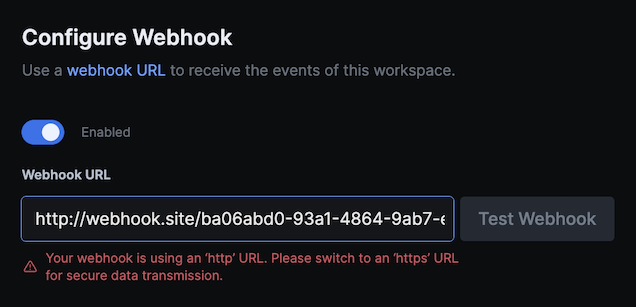
-
Only for HIPAA Workspaces - 100ms cryptographically signs its requests, and it is the responsibility of the customer to verify that the signature is valid.
Chat: ephemerality and access control
- 100ms chat messages are ephemeral by default, implying that messages exchanged in an active room session disappear after the session ends. These messages are not saved anywhere and encrypted in transmission and at rest.
- If a session is recorded, so is the session chat recording, and these are uploaded to the customers’ storage bucket.
- Customers are responsible for avoiding broadcast messages and specifying controls to send chat messages directly to specific peers in the room with the 100ms API. Additionally, if chat or chat recording isn’t required, please disable chat.
Data storage and protection
- 100ms has media clusters based in the USA, Europe and India.
- We have technical and administrative safeguards in place to detect breaches and unauthorized access to our media servers or databases.
Data collection by SDKs
- 100ms’ SDK generates anonymized device IDs instead of collecting actual device identifiers such as serial no. and device IDs.
- 100ms collects web browser name and version, along with SDK version for a specific call.
Creating a HIPAA workspace
The very first step to getting started with HIPAA is to create a HIPAA workspace. Creating this workspace is an irreversible action. Once created, a HIPAA workspace instigates changes on the dashboard which are reflective of the changes instrumented on 100ms’ backend infrastructure to make all the calls within the workspace HIPAA-compliant.
-
Click on the workspace selector in the left sidebar.
-
Click on ‘+ Create Workspace’.
-
Type in the Workspace name of your choice and select the ‘HIPAA Compliant’ checkbox. Then click on 'Create Workspace'.
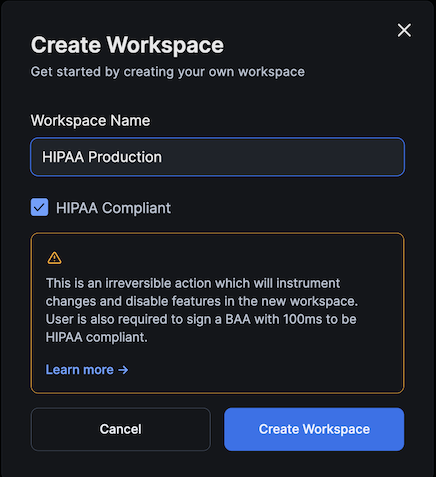
100ms HIPAA Workspaces can be distinguished by noting the HIPAA logo on the sidebar.
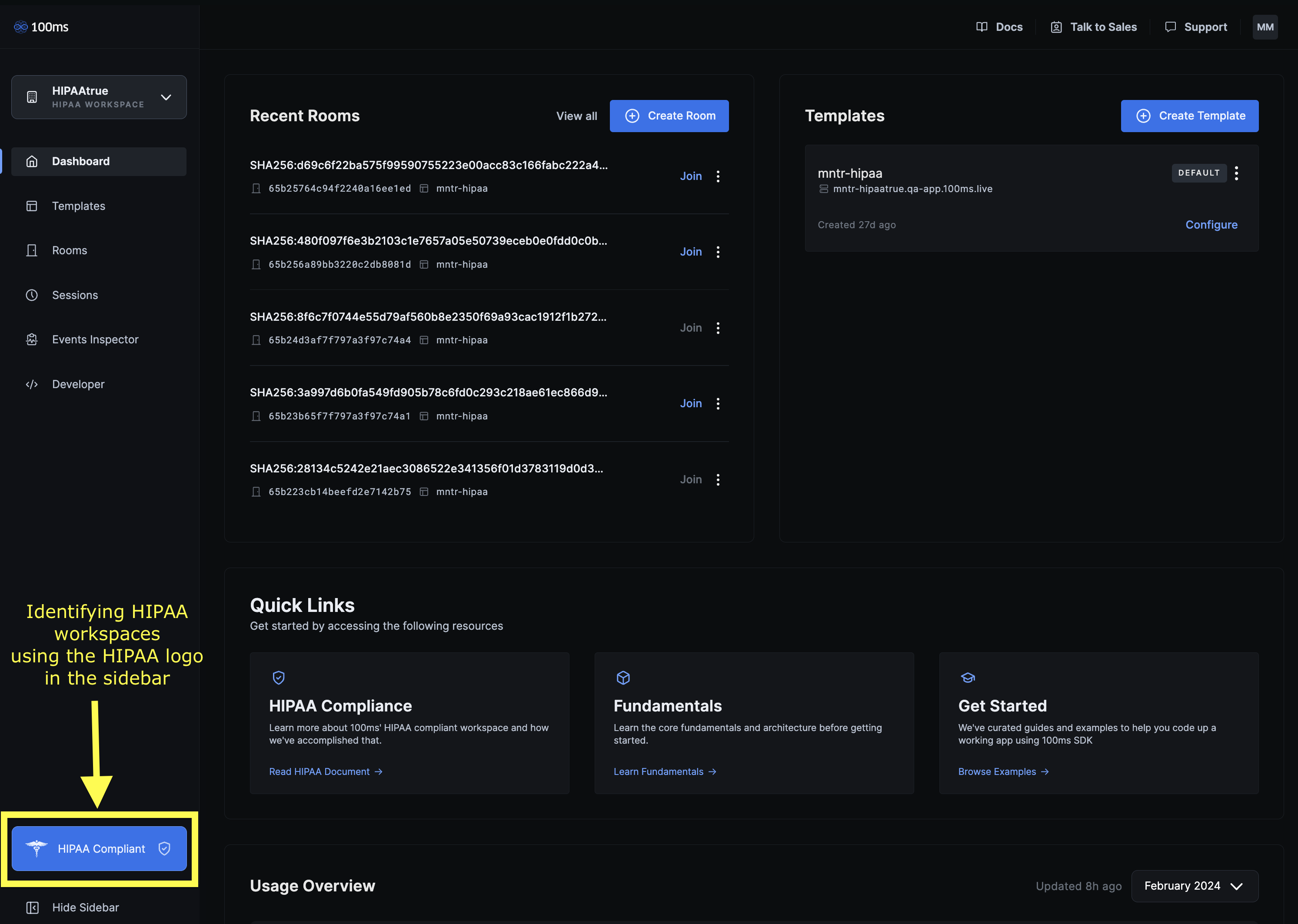
Understanding the changes in a HIPAA Workspace
Managing PII and PHI surface area
We have a standard policy of not collecting and storing any PHI or PII for HIPAA compliant workspaces. In fact, we actively try and stop users from sending us any PHI mistakenly by setting up appropriate checks and balances on possible information gateways.
100ms collects the following data points and updates their form so as to make sure that information cannot be used to identify individuals.
user_nameorpeer_name→ This information is one-way hashed using SHA-256 algorithm and stored within our system in that format.room_name→ Although this will possibly not consist of any PHI, but 100ms also does a one-way hash of room names using SHA-256 algorithm.- IP Address → IP Addresses of peers are masked and securely stored within our logs so as to not be able to identify associated individuals.
Note on hashed data
- Dashboard - Hashed data can be viewed and verified on 100ms dashboard on the following pages:
-
Rooms Page
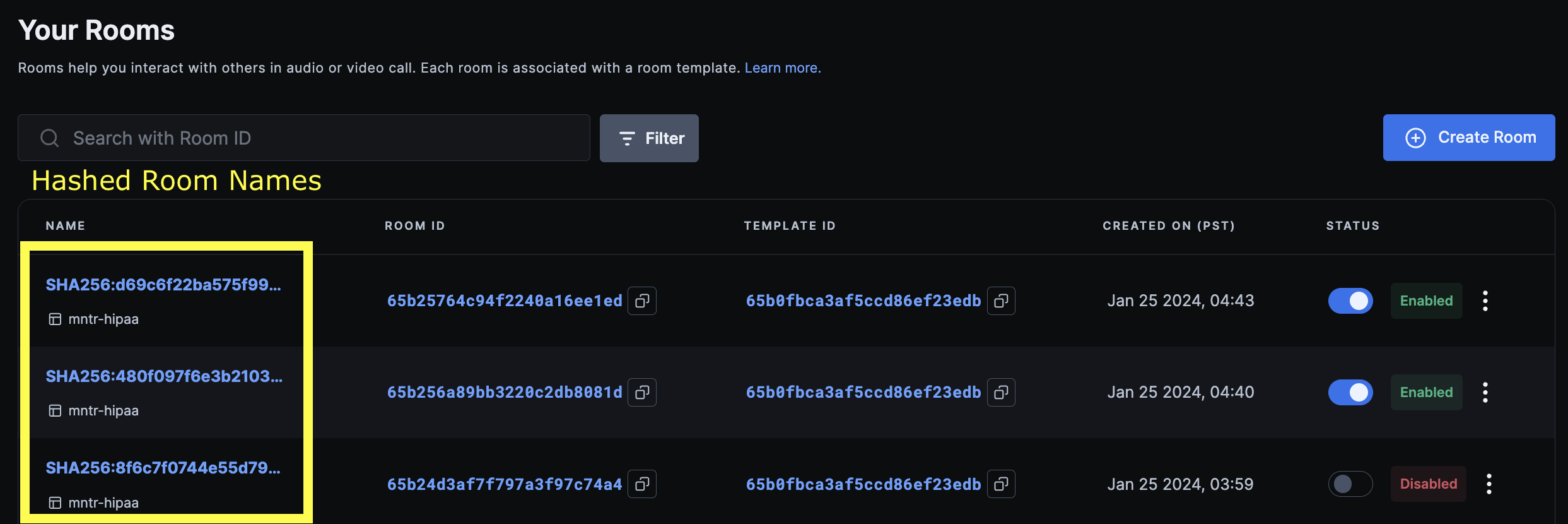
-
Room Details Page
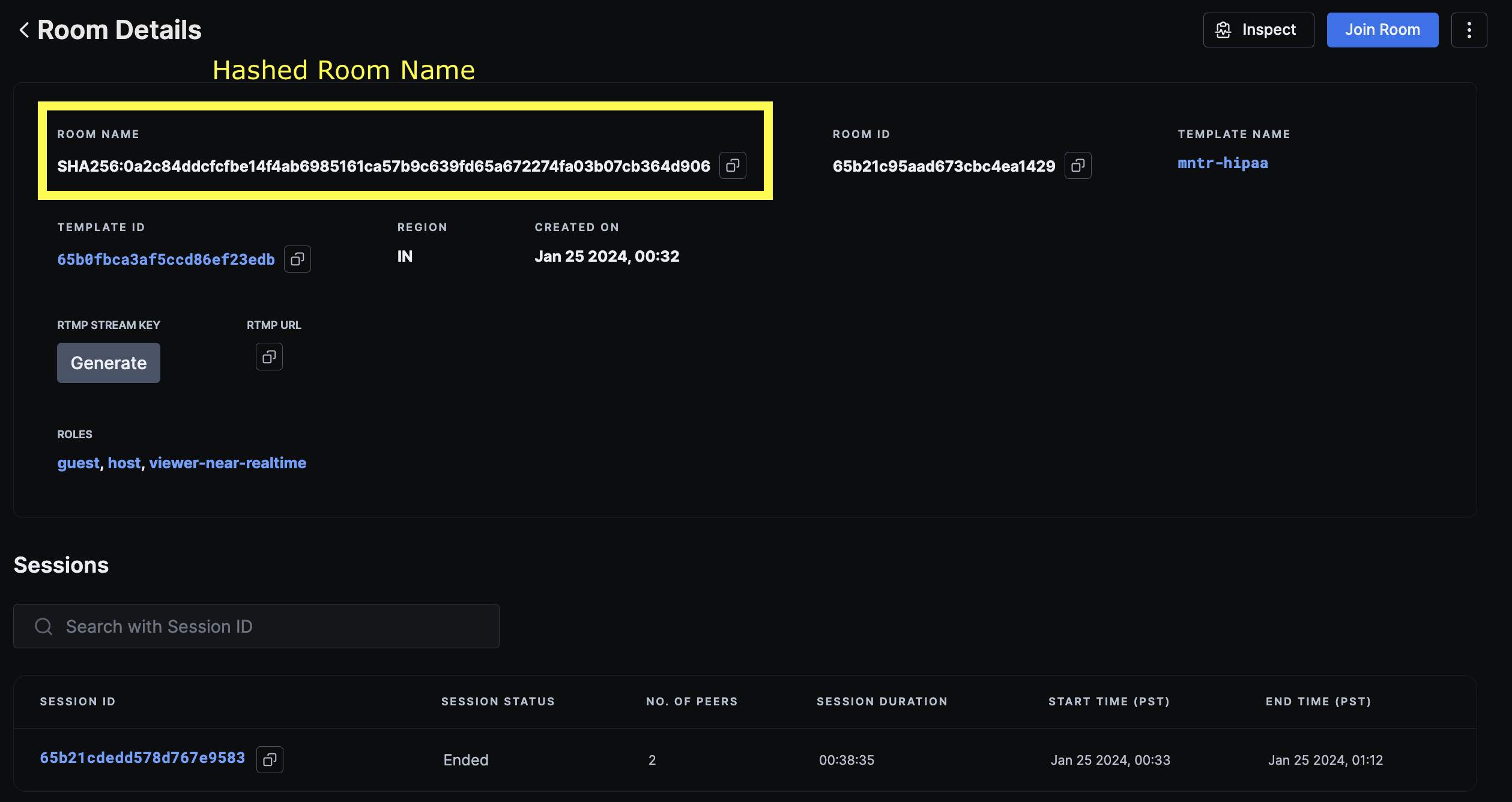
-
Session Details Page
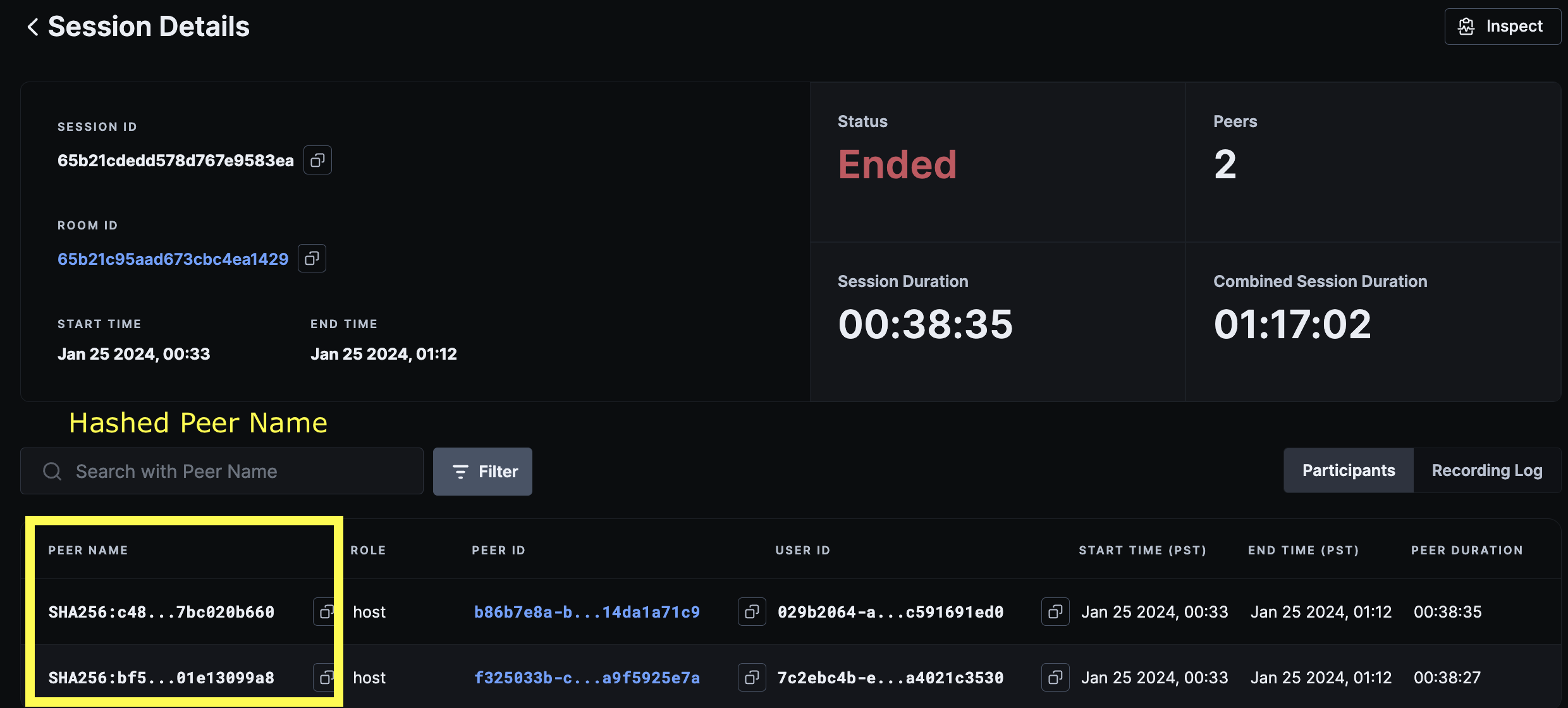
-
Participants Insights
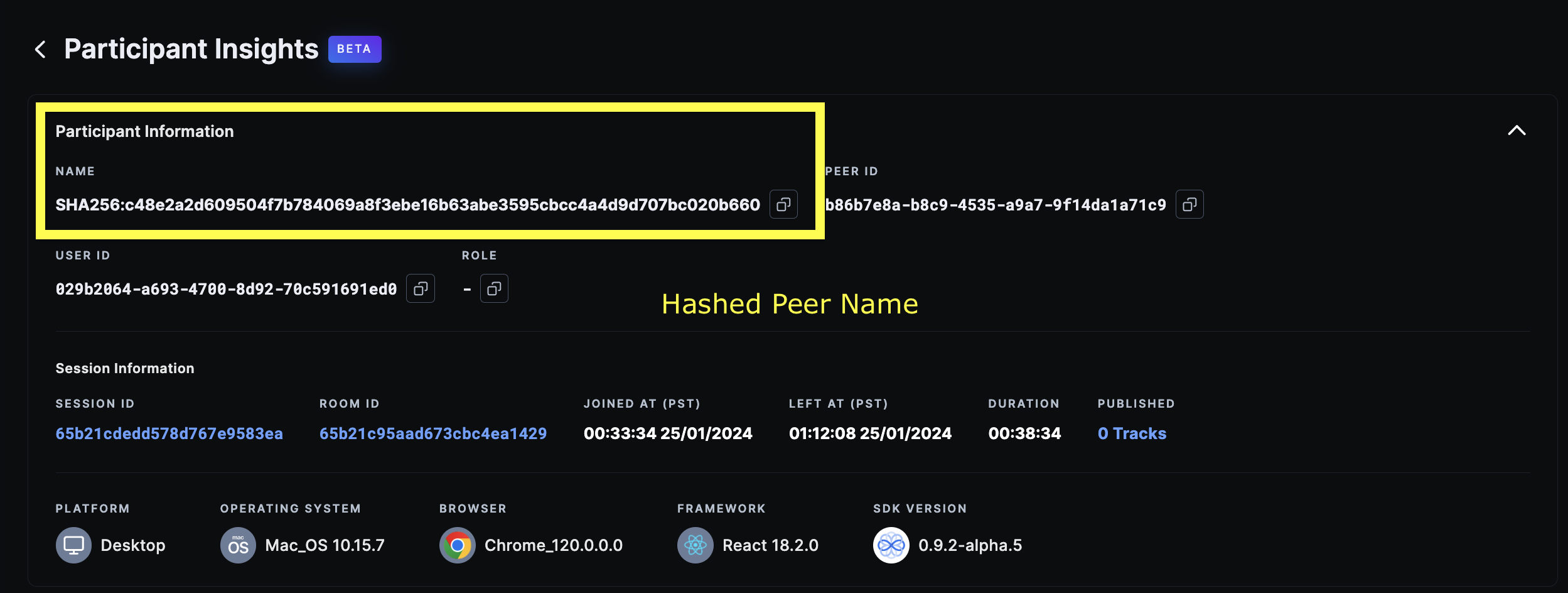
-
- REST APIs - All the APIs which return
room_nameorpeer_namein the response have them in the hashed format except Active Rooms REST API which returns the actualpeer_namebecause this data is returned from a live store. - Webhooks - All the webhooks which return
room_nameorpeer_namein the response have them in the hashed format.
Template settings
To make sure all the services that are being used are HIPAA compliant with no security risks, we only make the necessary services available to avoid any surface area for mistakes.
Following services and features can be enabled and used:
- Polls and Quizzes
- Composite Recording with user’s cloud storage bucket configured
- Recording with the customer’s cloud storage bucket configured on 100ms is the only method allowed by 100ms. As soon as the recording for a particular session is complete, it is uploaded to the customers’ storage and immediately deleted from ours.
- Access to customers’ buckets cannot be obtained by 100ms because write-only access is enforced when configuring the customer’s storage bucket.
- Closed Captions
- Post Call Transcription
- AI-Generated Summaries
- Noise Cancellation
- Whiteboard
- Session Initiation Protocol (SIP) - Audio and Video
- Chat
Following services within the template have been disabled and locked for the HIPAA Workspace:
- Live Streaming through HLS
- Live Streaming using RTMP-Out
- Track Recording
- Stream Recording
- Live Transcription for HLS
Following services are in the process of being HIPAA compliant:
- Track Recording
- Stream Recording
- Custom Composite Recording
Server Side
HIPAA Workspace changes will affect the REST APIs in the following ways:
- Rooms API
- All APIs will work as is with some minor changes.
- CRUD operations on a room will return hashed room
namein the response. - GET List Rooms API will allow search using hashed as well as un-hashed room
namefilter. - Room
descriptionhas been disabled. This will return an empty string no matter what is passed in the request.
- Active Rooms API
- GET Peer Details API and GET List of Peers API in the Active Room APIs are the only APIs to return un-hashed peer
namebecause this API extracts its details from an ongoing session in a room. - Active Rooms API is only operational for active rooms with ongoing sessions. As soon as the session ends, these details are deleted. So these peer details won’t be accessible using this API.
- GET Peer Details API and GET List of Peers API in the Active Room APIs are the only APIs to return un-hashed peer
- Live Streams and External Streams API
- For HIPAA Workspaces, the Start/Stop Live Stream APIs will return an error due to live streaming being disabled.
- Sessions API
- These APIs will work as is with hashed peer
namein the response.
- These APIs will work as is with hashed peer
- Room Codes API
- These APIs will work as is.
- Recordings API
-
POST Start Recording API won’t work unless user’s storage bucket credentials have been configured. The following error will show in the response.
{ "code": 500, "message": "hipaa enabled: recording config is not provided" } -
Rest of the APIs will function as is.
-
- Recording Assets API
- GET Presigned URL API will return an error as 100ms doesn’t have read access to the customer’s storage bucket.
- Rest of the APIs will function as is.
- Stream Key API
- These APIs will function as is but will not provide any value as Live Streaming is disabled for HIPAA Workspaces.
- Polls API
- These APIs will work as is.
SDK
100ms’ core platform SDKs as well as Prebuilt SDKs have been updated to work with HIPAA compliant workspaces. Please use the latest versions to be up to date with our security updates.
Additionally, all our SDKs have been open-sourced, allowing for their code to be reviewed if required.
Best practices to stay secure
User ID
Customers are requested to not use their users’ (patients’) email addresses, names or any other personal identifiers as their user IDs. Ideally, user IDs should be anonymized as they are something we neither mask, nor hash.
Webhooks
Customers building HIPAA compliant workflows are required to ensure that the requests to your web application are indeed coming from 100ms, and not a malicious third party.
-
Configure secret headers on 100ms dashboard.
-
All inbound requests to your application will be signed with an
x-100ms-signatureHTTP header. Sharing an example below on how to verify the webhook using this.import hmac import hashlib def verify_sha256_hmac(payload, secret_token, expected_hmac): """ Verifies the SHA256 HMAC for a given payload and secret token. :param payload: The payload (message) to verify. :param secret_token: The secret token used to generate the HMAC. :param expected_hmac: The expected HMAC value to compare against. :return: True if the HMAC matches, False otherwise. """ # Create a new hmac object using the secret token and sha256 hash function hmac_obj = hmac.new(secret_token.encode(), payload.encode(), hashlib.sha256) # Calculate the HMAC digest generated_hmac = hmac_obj.hexdigest() # Compare the generated HMAC with the expected HMAC if hmac.compare_digest(generated_hmac, expected_hmac): return True else: return False # Example usage payload = '<webhook_payload' secret_token = "<auth_secret>" expected_hmac = "<x-100ms-signature value>" is_valid = verify_sha256_hmac(payload, secret_token, expected_hmac) print("Is the HMAC valid?", is_valid)
Recordings
Once the storage bucket has been configured on the 100ms dashboard, it is recommended that a couple of test recordings be conducted and manually checked to ensure the recordings are being received in the bucket. Verification for recordings cannot be performed on 100ms due to the lack of read access to the customer's storage bucket in HIPAA workspaces. The path of the recording will be shared through the webhook or in API responses for recording assets or recordings.
Chat
Customers are responsible for avoiding broadcast messages and specifying controls to send chat messages directly to specific peers in the room with the 100ms API. Additionally, if chat or chat recording isn’t required, please disable chat.
Restricting Access to the HIPAA Workspace on 100ms Dashboard
It is technically possible for any developer with access to the workspace on the 100ms dashboard to access and join calls, particularly when the customer utilizes Prebuilt or 100ms' token server. It is recommended that access to the customer's 100ms dashboard and workspace be restricted to developers tasked with the creation and maintenance of templates, debugging, monitoring of usage, and the securing of secrets.
Signing the Business Associate Agreement (BAA)
Customers that are subject to HIPAA and intend to utilize 100ms to develop communication workflows containing PHI must execute a Business Associate Agreement (BAA) to 100ms Terms of Service. To learn more about this, contact us.
Note on entity status
Please let us be informed if your company is a Covered Entity or acts as a Business Associate to a Covered Entity. The nature of the contract to be signed will differ based on that. To understand more about your company status, read our blog on HIPAA compliance.
Creating and using a HIPAA workspace doesn’t guarantee HIPAA compliance until the customer signs a BAA with 100ms.
SOC2 Compliance
100ms is SOC2 Type 2 compliant. SOC2 defines criteria for managing customer data based on the five “trust service principles” of security, availability, processing integrity, confidentiality and privacy. SOC2 Type 2 is verified by external auditors and is developed by the American Institute of CPAs.
Frequently Asked Questions (FAQs)
-
How much does 100ms charge for signing the BAA and implementing HIPAA changes for my account?
We charge $500 / month for our healthcare add-on which includes HIPAA compliance and a signed BAA. This is offered free of charge if you opt for any of our paid support plans. To know more, please contact us.
-
Regarding the electronic PHI (ePHI) generated by your service, could you explain how it is created, where it is stored, and the lifecycle of this data?
Please refer to the given section.
-
Please elaborate on the encryption methods used for securing media and ePHI both in transit and at rest.
Please refer to our basics section.
-
For any subcontractors or third-party services you engage with, who might have access to PHI, do you establish Business Associate Agreements (BAAs)? How do you ensure their compliance with HIPAA? What are these services?
We have signed BAAs with critical services and features which will have temporary access to the customers’ ePHI.
-
Is there any data stored and retained by 100ms or its sub-professors for the purpose of training any AI models?
Recordings can be stored with 100ms for upto 7 days, in case of a failure of processing or upload to the customer's configured storage bucket. Transcripts or summaries aren't stored with 100ms and aren't used for training any AI models.
-
Can a workspace be deleted?
A workspace cannot be deleted at this point of time. If you do require this, please reach out to us through the support widget on 100ms dashboard.



